July 15, 2020 •
Wisconsin Ethics Commission Adopts Formal Opinion
The Wisconsin Ethics Commission adopted a formal opinion stating lobbyists may make a campaign contribution to partisan elective state officials and candidates for partisan elective office, regardless of whether the individual is on the ballot for that election, during the […]
The Wisconsin Ethics Commission adopted a formal opinion stating lobbyists may make a campaign contribution to partisan elective state officials and candidates for partisan elective office, regardless of whether the individual is on the ballot for that election, during the contribution window.
The contribution window begins the first day authorized by law for the circulation of nomination papers as a candidate at a general election or special election and closes the day of the general or special election.
A contribution to a candidate for legislative office may only be made during the period if the Legislature has concluded its final floor period and is not in special or extraordinary session.
The contribution window opened on May 14 and will close on November 3.
March 5, 2020 •
Arkansas Contribution Blackout Unenforceable
An order barring the state from enforcing a campaign contribution blackout period of more than two years was reinstated on March 3. Arkansas Code Annotated 7-6-203(e) prohibits candidates for state offices from accepting campaign contributions more than two years before […]
An order barring the state from enforcing a campaign contribution blackout period of more than two years was reinstated on March 3.
Arkansas Code Annotated 7-6-203(e) prohibits candidates for state offices from accepting campaign contributions more than two years before an election.
In place since 1996, the constitutionality of the law was challenged in June 2019.
The court agreed to stay the injunction, keeping the law in effect while the proceedings continued.
The injunction was affirmed on January 27.
This prompts the plaintiff’s attorney to push for the stay to be lifted, and the law to become unenforceable.
The stay was lifted on March 3, enjoining the state from enforcing the law while the lawsuit is pending.
A date has yet to be determined for a final hearing on the matter.
January 30, 2020 •
Injunction Upheld in Arkansas Campaign Contribution Blackout Case
A panel of federal appellate judges held on January 27 that a campaign contribution blackout law that has been in place in Arkansas since 1996 is likely unconstitutional. The panel upheld a preliminary injunction that U.S. District Judge James Moody […]
A panel of federal appellate judges held on January 27 that a campaign contribution blackout law that has been in place in Arkansas since 1996 is likely unconstitutional.
The panel upheld a preliminary injunction that U.S. District Judge James Moody Jr. imposed June 17 to prohibit Arkansas Code Annotated 7-6-203(e) from being enforced while its constitutionality is determined.
The law, part of a package of campaign-finance measures approved by voters in 1995, bars candidates for state offices from accepting campaign contributions more than two years before an election.
The constitutionality of the law was challenged as an infringement on the right of political expression by preventing contributions to potential candidates in the 2022 election cycle.
The state argued that the purpose of the blackout period is to prevent corruption or the appearance of corruption, but the panel said it hadn’t shown that early contributions present a greater risk of corruption than later contributions.
The Office of the Attorney General could seek a rehearing before the full 8th Circuit within 14 days.
September 23, 2019 •
Montana Increases Campaign Contribution Limits
Campaign contribution limits increased following an every other year adjustment to match inflation required by state law. The amount an individual or PAC may give to a campaign for governor rose from $680 to $710 per election. The aggregate amount […]
Campaign contribution limits increased following an every other year adjustment to match inflation required by state law.
The amount an individual or PAC may give to a campaign for governor rose from $680 to $710 per election.
The aggregate amount a PAC may give to a candidate for state Senate rose from $2,850 to $3,050.
Additionally, the same amount rose from $1,750 to $1,850 for a candidate for state House.
The Commissioner of Political Practices is in charge of calculating the increase by multiplying last cycle’s limits by an inflation factor provided by statute.
The new contribution limits took effect September 21. Contributions made before that date are subject to the old limits.
However, those who have already given money may contribute again up to the new limits.
August 7, 2018 •
Lawsuit Filed to Remove Issue from Missouri Ballot
A lawsuit has been filed to remove a referendum from the Missouri ballot. On August 2, Sec. of State Jay Ashcroft certified an ethics initiative for the November general election ballot. The proposal would limit legislative gifts from lobbyists, reduce […]
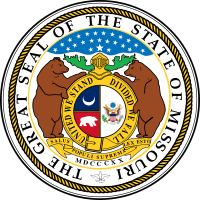 A lawsuit has been filed to remove a referendum from the Missouri ballot. On August 2, Sec. of State Jay Ashcroft certified an ethics initiative for the November general election ballot.
A lawsuit has been filed to remove a referendum from the Missouri ballot. On August 2, Sec. of State Jay Ashcroft certified an ethics initiative for the November general election ballot.
The proposal would limit legislative gifts from lobbyists, reduce campaign contribution limits for legislative candidates, create a two-year waiting period for public officials seeking to become lobbyists, and establish new procedures for redistricting.
The lawsuit claims the proposed referendum violates a provision of the Missouri Constitution limiting ballot measures to a single subject.
Combining multiple subjects in a single ballot measure can force voters to vote for a matter they do not support just to enact a proposal they do support.
An organization named Clean Missouri submitted to the secretary of state nearly 350,000 signatures in support of an initiative for the November ballot. If passed by voters, the initiative would ban lobbyist gifts to state lawmakers and lower campaign contribution […]
 An organization named Clean Missouri submitted to the secretary of state nearly 350,000 signatures in support of an initiative for the November ballot.
An organization named Clean Missouri submitted to the secretary of state nearly 350,000 signatures in support of an initiative for the November ballot.
If passed by voters, the initiative would ban lobbyist gifts to state lawmakers and lower campaign contribution limits.
The issue must be reviewed prior to being approved for the 2018 ballot.
March 24, 2017 •
News You Can Use Digest – March 24, 2017
Federal: Despite a Trust, Ivanka Trump Still Wields Power Over Her Brand New York Times – Rachel Abrams | Published: 3/20/2017 Ivanka Trump, who moved to Washington saying she would play no formal role in her father’s administration, is now […]

Federal:
Despite a Trust, Ivanka Trump Still Wields Power Over Her Brand
New York Times – Rachel Abrams | Published: 3/20/2017
Ivanka Trump, who moved to Washington saying she would play no formal role in her father’s administration, is now officially setting up shop in the White House. The powerful first daughter has secured her own office on the West Wing’s second floor. She is also in the process of obtaining a security clearance and is set to receive government-issued communications devices. In everything but name, Trump is settling in as what appears to be a full-time staffer in her father’s administration, with a broad and growing portfolio, except she is not being sworn in, will hold no official position, and is not pocketing a salary, her attorney said. Watchdogs immediately questioned whether she is going far enough to eliminate conflicts-of-interest, especially because she will not be automatically subjected to certain ethics rules while serving as a de facto White House adviser.
Ethics Watchdogs Make a Career of It
Roll Call – Kate Ackley | Published: 3/16/2017
Norm Eisen, President Barack Obama’s White House ethics czar, and Richard Painter, an ethics lawyer from the George W. Bush administration, have teamed up to become two of the most vocal critics of President Donald Trump’s conflicts-of-interest. They not only sued the president within days of his inauguration, they have also appeared regularly on television and testified on Capitol Hill. Though government ethics law may seem a lonely pursuit, leading a resistance against the Trump team’s web of potential ethics woes clearly is not. “I never imagined that White House ethics experts would be in such demand,” Eisen said.
From the States and Municipalities:
Florida – Will Legislators Lift the Veil on ‘Dark Money’ in Florida Politics?
Bradenton Herald – Mary Ellen Klas (Miami Herald) | Published: 3/19/2017
In the ramp-up to the annual legislative session, before the self-imposed fundraising ban takes effect, Florida’s most politically powerful corporations seed hundreds of thousands of dollars in campaign cash into the committees of legislators. But getting all the details on who got what is impossible. Florida law allows groups that accept contributions from corporations to legally distribute money to other political committees, including those controlled by legislators, without reporting the original source of the cash. The practice of shielding political spending from public view has fueled the “dark money” trend in politics that has allowed groups to launch political attacks in campaigns without fear of being traced.
Illinois – Emails to Emanuel Raise Questions About Dozens of Possible Lobbying Violations
Chicago Tribune – Bill Ruthhart and Hal Dardick | Published: 3/21/2017
The Chicago Tribune reviewed over 2,600 pages of Mayor Rahm Emanuel’s personal emails, and found 26 instances where lobbyists, corporate executives, and longtime Emanuel associates and campaign donors sought action from, or access to, the mayor or city officials but did not register as a lobbyist or report their contact to the city ethics board. Some of those who sent emails pitching their business said they did not believe their actions qualified as lobbying or they were not familiar with the city’s ethics rules. But if the board determines someone sought to influence City Hall action but did not register as a lobbyist, it can fine the individual $1,000 per day from five days after the initial contact until they register.
Massachusetts – Construction Firm, Owner Pay $150,000 for Campaign Finance Violations
Boston Globe – Frank Phillips | Published: 3/22/2017
A Massachusetts business owner and his construction company have paid $150,000 for disguising the true source of campaign contributions. The Office of Campaign and Political Finance said J. Derenzo Companies gave $37,000 to employees and their family members to reimburse them for donations they made to nine candidates, including Gov. Charlie Baker and former Gov. Deval Patrick. The contributions were reported as coming from the individuals. State law prohibits disguising the true origin of a donation and bans corporate contributions. The company and its owner, David Howe, agreed to pay $125,000 to the state’s general fund. Howe also gave $25,000 to a charity with personal funds as part of the agreement.
Mississippi – Politicians Will See Campaign Spending Curbed
Hattiesburg American – Geoff Pender | Published: 3/22/2017
The Mississippi Legislature passed a campaign finance reform measure that would restrict politicians’ spending campaign money on personal expenses and provide for some enforcement and oversight by the state Ethics Commission. Gov. Phil Bryant is expected to sign the bill into law, to take effect January 1. Experts have called Mississippi’s lack of rules and transparency on campaign money – and allowing it to be used for personal expenses – “legalized bribery,” with special-interest cash making its way into politicians’ pockets after it runs through their campaign accounts. Campaign money is shielded from tax, ethics, bribery, and other laws because it is ostensibly to be used for campaigning and records of it are supposed to be open to the public.
New Mexico – Voters Will Decide Future of State Ethics Commission Proposal
New Mexico Politics – Steve Terrell (Santa Fe New Mexican) | Published: 3/16/2017
New Mexico voters will decide next year whether to create an independent ethics commission to shore up trust in government after a string of corruption scandals. The Legislature approved a constitutional amendment that calls for creating a seven-member body to investigate ethics violations and apply sanctions. The vote capped a decades-long effort by government watchdog groups and select lawmakers to put ethics complaints in the hands of an independent authority.
New York – Lobbyist in Libous Case Reaches $10k Settlement, as Legal Questions Remain
Albany Times Union – Chris Bragg | Published: 3/17/2017
Lobbyist Fred Hiffa, whose firm made payments to a law firm employing the son of late New York Sen. Thomas Libous at a time it regularly lobbied the once-influential politician, agreed to pay $10,000 to settle ethics charges. The Joint Commission on Public Ethics (JCOPE) said Hiffa arranged for payments totaling $50,000 over one year to the law firm that employed Libous’ son. Libous was convicted of lying to the FBI about his son’s arrangement. But some legal experts said the gift ban law at the center of JCOPE’s case does not seem to apply to the Libous matter, as well as the case of former Sen. Dean Skelos, who was convicted on corruption charges relating to companies hiring his son.
New York – No Charges, but Harsh Criticism for Mayor de Blasio
New York Times – William Rashbaum | Published: 3/16/2017
Prosecutors said New York City Mayor Bill de Blasio and his aides will not face criminal charges for their role in soliciting donations for the mayor’s campaign and an affiliated nonprofit group, the Campaign for One New York. The investigation involved accusations that de Blasio and his aides gave favorable treatment to donors who contributed to his 2013 mayoral election campaign. Also at issue is whether the de Blasio team illegally raised money for several key state senate races. Acting U.S. Attorney Joon Kim said the decision not to file charges was based, among other things, on the high burden of proof required in prosecuting serious public corruption cases, the clarity of existing law, and the difficulty in proving criminal intent in corruption schemes where there is no evidence of personal profit.
North Carolina – Judges Issue Split Ruling on NC Governor-Legislature Power Struggle
Charlotte Observer – Anne Blythe (Raleigh News & Observer) | Published: 3/17/2017
A three-judge panel delivered a mixed decision in the power struggle between Gov. Roy Cooper and legislative leaders in North Carolina. The General Assembly passed two laws that require Senate confirmation of Cooper’s cabinet secretaries, cut the number of state positions to which the governor can appoint supporters, and overhauled the structure of North Carolina’s state and county elections boards. The panel agreed with Cooper that the law calling for combining the State Board of Elections and the State Ethics Commission was unconstitutional. The judges also ruled that a provision cutting the number of at-will policy-making and managerial positions in Cooper’s administration should be blocked. The judges upheld the Senate’s right to confirm the governor’s cabinet secretaries, saying Cooper has not demonstrated his administration will be hurt by the law.
Oklahoma – Oklahoma State Senator Faces Charges and Condemnation
New York Times – Matthew Haig | Published: 3/17/2017
Oklahoma Sen. Ralph Shortey was accused in a child prostitution case of offering to pay a 17-year-old boy for sex. Shortey was charged with three felony counts one week after police found him with the teenager in a hotel room. The maximum punishment, if convicted, is 25 years in prison. The Senate voted to punish Shortey for “disorderly behavior.” The unanimous vote stripped him of most of his privileges at the Capitol, including his office and parking space.
Pennsylvania – D.A. Seth Williams Indicted on Corruption, Bribery-Related Charges
Philadelphia Inquirer – Jeremy Roebuck, David Gambacorta, and Chris Brennan | Published: 3/21/2017
Philadelphia’s top prosecutor was charged with taking more than $160,000 in luxury gifts, Caribbean trips, and cash, often in exchange for official favors that included help with a court case, according to a bribery and extortion indictment. Federal prosecutors said District Attorney Seth Williams also spent $10,000 from a joint account he shared with a relative meant for the relative’s nursing home costs. The indictment caps a nearly two-year investigation into Williams’ financial affairs. In January, the city Board of Ethics imposed its largest fine ever, $62,000, on Williams for failing to disclose gifts and sources of income, and accepting gifts from prohibited sources.
Pennsylvania – Former Top Allentown Bureaucrat Francis Dougherty Pleads Guilty, Implicates Mayor
Allentown Morning Call – Emily Opilo | Published: 3/22/2017
Former Allentown Managing Director Francis Dougherty pleaded guilty to a conspiracy charge in an ongoing FBI “pay-to-play” corruption probe. Prosecutors say Dougherty helped rig a $3 million contract to replace the city’s streetlights so it would go to a company whose executives and consultants gave thousands of dollars in campaign contributions to Mayor Ed Pawlowski. The mayor has not been charged, but he matches the description of the unnamed public official in court papers. As part of his plea deal, Dougherty must continue to cooperate with prosecutors concerning his knowledge of and participation in political corruption in Allentown.
South Carolina – Veteran State Sen. Courson of Columbia Suspended from Office after Misconduct Indictment
The State – John Monk | Published: 3/16/2017
One of South Carolina’s longest-serving senators has been indicted on ethics charges tied to veteran powerbroker Richard Quinn. A grand jury indicted Sen. John Courson on misconduct in office and using campaign donations for personal expenses. All three charges are tied to Courson’s payments to Quinn’s political consulting firm. Lt. Gov. Kevin Bryant suspended Courson pending the case’s resolution. The indictments allege Courson gave Quinn’s firm nearly $248,000 and received back nearly $133,000 for personal use. The Quinn firm has not been charged with any wrongdoing.
Texas – Dallas City Council Overhauls Ethics Rules; Mayor Mike Rawlings Lauds Changes as ‘Remarkable’
Dallas News – Tristan Hallman | Published: 3/22/2017
The Dallas City Council approved changes to the ethics law. The reforms include lowering the gift-reporting threshold to $250, requiring attorneys and law firms representing clients – along with leaders of associations – to register as lobbyists, and prohibiting city council members from discussing ongoing contract bids. Council members voted down several of their colleagues’ attempts to include additional changes. The ordinance will take effect on July 1, 2017.
 State and Federal Communications produces a weekly summary of national news, offering more than 60 articles per week focused on ethics, lobbying, and campaign finance.
State and Federal Communications produces a weekly summary of national news, offering more than 60 articles per week focused on ethics, lobbying, and campaign finance.
The Board of Aldermen passed two bills on October 7 to establish campaign contribution limits and clarify gift reporting. Board Bill 53 limits campaign contributions in city elections to $10,000 per election cycle. Violations could result in 90 days of […]
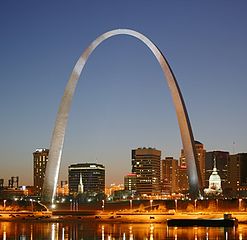 The Board of Aldermen passed two bills on October 7 to establish campaign contribution limits and clarify gift reporting.
The Board of Aldermen passed two bills on October 7 to establish campaign contribution limits and clarify gift reporting.
Board Bill 53 limits campaign contributions in city elections to $10,000 per election cycle. Violations could result in 90 days of jail and a $500 fine. If signed by Mayor Francis Slay, the bill would be effective April 6, 2017, just after the spring mayoral election.
Board Bill 126 requires elected officials to report gifts and travel expenses valued at $375 or more when given by interested persons. Violating the reporting requirement would result in docked pay. Currently, the code requires reporting of gifts exceeding $250, but it is not clear whether public officials are reporting gifts as required.
Photo of the Gateway Arch in St. Louis by Daniel Schwen in Wikimedia Commons.
June 7, 2016 •
Tuesday Lobbying and Campaign Finance News Update
Lobbying Florida: “Bryant Miller Olive Appeals $50 Fine – and Loses” by Jim Rosica for Florida Politics Campaign Finance “Study: Ordinary people struggle to use many state campaign finance websites” by Alex Koma for StateScoop Missouri: “Four Years Later, an […]
 Lobbying
Lobbying
Florida: “Bryant Miller Olive Appeals $50 Fine – and Loses” by Jim Rosica for Florida Politics
Campaign Finance
“Study: Ordinary people struggle to use many state campaign finance websites” by Alex Koma for StateScoop
Missouri: “Four Years Later, an Ex-Politician Is Still Benefiting from His Campaign Fund” by Kevin McDermott for St. Louis Post-Dispatch
North Dakota: “Feds Dismiss Foreign Campaign Contribution Allegations against ND Politicians” by John Hageman for Grand Forks Herald
Ethics
California: “Former CalPERS Chief Sentenced to Prison in Bribery Scandal” by Dale Kasler for Sacramento Bee
Florida: “Hialeah Restaurant Owner Tried to Bribe Commissioner, State Says” by David Ovalle for Miami Herald
South Carolina: “SC Ethics Reforms Stalled after 4 Years of Debate” by Jamie Self for The State
Elections
“The Seven Broken Guardrails of Democracy” by David Frum for The Atlantic
Virginia: “Virginia at Center of Racially Charged Fight Over the Right of Felons to Vote” by Sheryl Gay Stolberg for New York Times
June 3, 2016 •
CA Campaign Contribution Bill Passes Assembly
The California Assembly passed AB 2523 on Thursday. The bill would limit campaign contributions to $4,200 in local governments that do not already have established campaign contribution limits. The bill includes a provision for local governments to reject the limit […]
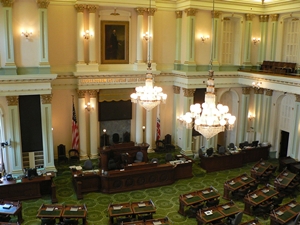 The California Assembly passed AB 2523 on Thursday.
The California Assembly passed AB 2523 on Thursday.
The bill would limit campaign contributions to $4,200 in local governments that do not already have established campaign contribution limits. The bill includes a provision for local governments to reject the limit if local voters agree.
The bill passed 43-15 and is being sent to the Senate.
The Pierce County Superior Court invalidated a Washington campaign finance law requiring free legal advice given to a recall campaign to be treated as a reportable campaign contribution. Judge Katherine Stolz reasoned pro bono representation in civil rights cases would […]
 The Pierce County Superior Court invalidated a Washington campaign finance law requiring free legal advice given to a recall campaign to be treated as a reportable campaign contribution. Judge Katherine Stolz reasoned pro bono representation in civil rights cases would be threatened if such representation must be reported as a campaign contribution and therefore subject to applicable state political contribution limits.
The Pierce County Superior Court invalidated a Washington campaign finance law requiring free legal advice given to a recall campaign to be treated as a reportable campaign contribution. Judge Katherine Stolz reasoned pro bono representation in civil rights cases would be threatened if such representation must be reported as a campaign contribution and therefore subject to applicable state political contribution limits.
As a result of the ruling, the Public Disclosure Commission cannot cap legal services to political committees in a federal civil rights case, nor can it compel political committees to report free legal services as campaign contributions.
February 23, 2015 •
Lincoln, Nebraska Mayor Accepts Contributions from City Contractors
Mayor Chris Beutler’s campaign fundraising tactics have come under scrutinty by watchdog groups decrying pay-to-play politics. During the 2013 construction of the Pinnacle Bank Arena, a $186 million project, the mayor accepted contributions from individuals and companies with city contracts, […]
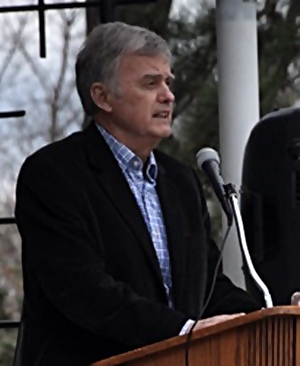 Mayor Chris Beutler’s campaign fundraising tactics have come under scrutinty by watchdog groups decrying pay-to-play politics.
Mayor Chris Beutler’s campaign fundraising tactics have come under scrutinty by watchdog groups decrying pay-to-play politics.
During the 2013 construction of the Pinnacle Bank Arena, a $186 million project, the mayor accepted contributions from individuals and companies with city contracts, many with connections to the city-financed arena.
Campaign finance reports show contributions from arena-related companies continued throughout 2014 as well. This practice, however, is not illegal in Lincoln.
Proponents of tougher pay-to-play laws believe restrictions are more important at the local level, arguing smaller contributions buy greater influence in city races compared to state or federal campaigns.
Mayor Beutler is up for reelection this May.
Photo of Mayor Chris Beutler by Lincolnearthday on Wikimedia Commons.
November 18, 2014 •
No Changes Made to Campaign Contribution Limits in Akron
On Monday, the Akron City Council rules committee voted to wait to make changes to the city’s campaign contribution limits. Council President Gary Moneypenny’s proposal would have increased the limits for mayoral and council candidates by $100. Former Councilman Warner […]
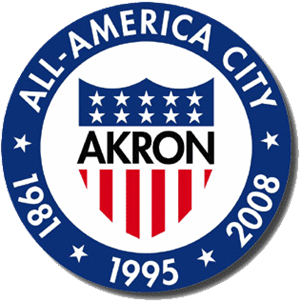 On Monday, the Akron City Council rules committee voted to wait to make changes to the city’s campaign contribution limits.
On Monday, the Akron City Council rules committee voted to wait to make changes to the city’s campaign contribution limits.
Council President Gary Moneypenny’s proposal would have increased the limits for mayoral and council candidates by $100.
Former Councilman Warner Mendenhall, who promoted a petition for the original contribution limits in 1998, protested the proposed changes during the afternoon committee meeting.
October 14, 2014 •
California FPPC Announces Proposed Amendments
The Fair Political Practices Commission (FPPC) has given notice of proposed amendments to regulations in Title 2, Division 6 of the California Code of Regulations. The FPPC will make adjustments to the gift and campaign contribution limits to reflect changes […]
 The Fair Political Practices Commission (FPPC) has given notice of proposed amendments to regulations in Title 2, Division 6 of the California Code of Regulations. The FPPC will make adjustments to the gift and campaign contribution limits to reflect changes in the consumer price index.
The Fair Political Practices Commission (FPPC) has given notice of proposed amendments to regulations in Title 2, Division 6 of the California Code of Regulations. The FPPC will make adjustments to the gift and campaign contribution limits to reflect changes in the consumer price index.
In order to provide the adjustment in time for the new calendar year, the November index is used to make the final calculation. The proposed amendments make adjustments for the period from January 1, 2015, through December 31, 2016.
The FPPC will consider the proposed regulations at a public hearing on or after November 20, 2014. The proposed amendments are available here.
State and Federal Communications, Inc. provides research and consulting services for government relations professionals on lobbying laws, procurement lobbying laws, political contribution laws in the United States and Canada. Learn more by visiting stateandfed.com.


